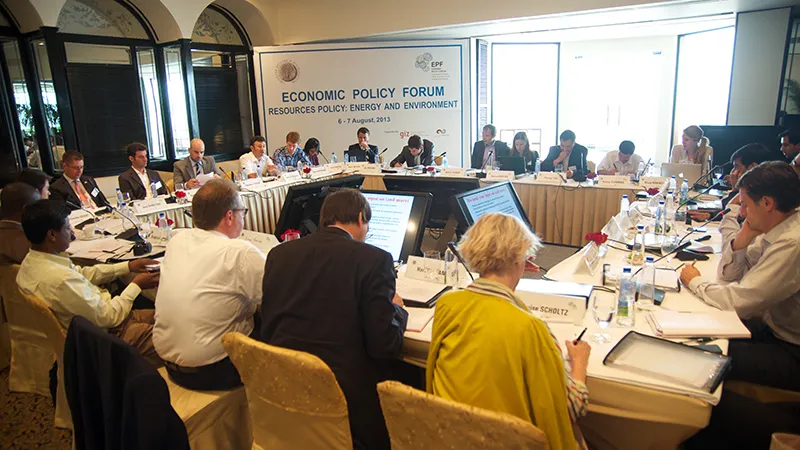After a successful launch in January this year in Berlin, the Economic Policy Forum, a new alliance of think tanks from emerging economies and selected developed economies, met at a conference on 'Resources Policy: Energy and Environment.' The meeting also facilitated an initial conversation on 'The Prospects for Regional Integration.'

After a successful launch in January this year in Berlin, the Economic Policy Forum (EPF) met at a conference on 'Resources Policy: Energy and Environment,' hosted by Observer Research Foundation (and supported by Deutsche Gesellschaft für Internationale Zusammenarbeit (GIZ), in New Delhi. The meeting also facilitated an initial conversation on 'The Prospects for Regional Integration.'
The EPF is a new alliance of think tanks from emerging economies and selected developed economies, with the objective to foster and support joint research among members on common challenges and issues of socio-economic development in their countries.
The conference comprised representatives from BRICS, Germany, and Azerbaijan. The aim of the conference was to facilitate discussions towards the production of a joint paper composed of four topics including: 'Future of Global Energy: How "green" will energy be?;' 'Energy Access and Redistribution Schemes;' 'Experiences around Responsible Business: Resource Efficiency;' and, 'Supply Side Economics and the Need for Energy Diversification.'
In the first session, Dr. Rajan Gupta, a distinguished fellow at ORF, presented the first draft paper entitled, 'Future of Global Energy: How "green" will energy be?' He emphasised the need for new, clean forms of energy to drive global development. For the first time in history, humankind is required to move away from easily accessible energy, in the form of unclean fossil fuels, for the purposes of mitigating climate change. Gupta suggested that newer technology, better business models, and a diversified energy portfolio are prerequisites for making energy cleaner and more sustainable. Meanwhile, he highlighted the need to recognize regional disparities in resources. Certain regions are still rich in fossil fuels, such as North America, Russia and the Middle East, but others lack sufficient indigenous resources, such as Sub-Saharan Africa, Europe, and the Asian Tigers.
These disparities were illustrated in the ensuing discussion. Russia, South Africa, and China are highly dependent on fossil fuels, whereas Brazil and the EU have more diversified, cleaner energy production. All countries are exploring cleaner energy production. Russia for example is looking into greener measures in order to hedge the risks of rising carbon fuel prices in future. China is implementing a national programme that selects 1000 villages, 200 cities, and 200 counties to be models for renewable energy distribution, and the EU has formulated a number of goals to reduce carbon emissions and focuses on technological and efficiency improvements across all energy sectors. Given such disparities there cannot be a one-size-fits-all energy policy, and each country must determine its own development goals before defining its own policies.
A point that frequently arose during discussions was the role of crisis and hunger for change, in providing the impetus for transforming energy policy. For example, Brazil's diversified green energy sector was necessitated by the oil crisis in the 1970s. There is a need to change social attitudes so that transformation may occur even in countries that are currently more energy-secure than others.
The second draft paper, 'Energy Access and Redistribution Schemes,' encompassed all country perspectives. India, China, Russia, and South Africa all reported lack of electricity access to large portions of their populations, while Brazil and the EU have better overall access but still face new challenges. General trends in India show that the lack of grid-based power in rural areas has led poor households to spend more of their income on inefficient, polluting energy such as biomass, than wealthier households do on cleaner, grid-based energy. There is still debate as to whether to expand the national grid to rural areas, particularly when there is a high instance of rural-urban migration. China's rural poor also rely on biomass for fuel, but the government is planning to subsidise biogas and upgrade the national grid in its Twelfth Five Year Plan to overcome this. Russia's electricity access problems are often caused by the extreme weather and vast distances within the country, and the government suggests that renewables would be more suitable for supplying rural areas rather than extending the national grid. South Africa suffers from an overloaded national grid and there are disagreements about how fair it is to supply rural areas with renewable but not grid-based energy. Brazil no longer has problems with electricity access in rural areas thanks to a successful Luz Para Todos ('Lighting For All') programme implemented in 2003. The EU also has few problems with electricity access, but is facing new challenges because energy is no longer affordable to poorer communities.
The third session was led by Vivan Sharan from ORF, who presented his draft paper on 'Experiences around Responsible Business: Resource Efficiency.' The aim of the paper is to consider business' responsibility in ensuring sustainable energy use, which encompasses resource security, energy efficiency, employment generation and long-term capital formation. The paper will explore the correlation between energy efficiency and annual revenue of a list of the most profitable businesses in Brazil, Germany, India, Russia, and South Africa. Sectors to be examined include cement, manufacturing, power, and oil and gas. Once the list of profitable businesses has been identified, the paper will analyse their energy efficiency performances and attempt to explain trends through possible market and policy drivers. This paper hopes to use its findings to influence business' energy policy decisions.
The fourth draft paper addressed 'Supply Side Economics and the Need for Energy Diversification'. It was presented by Dr. Rajan Gupta. With prospects of high constraints in energy resources in the next 30 years, the presentation emphasised the need for all countries to diversify their energy sourcing. Factors to consider include improving infrastructure, investing in technology, building partnerships between countries and between the public and private sectors, and balancing imports and exports of resources. There are, however, many barriers to such attempts at diversifying, such as poor levels of education, unskilled workforces, low levels of entrepreneurship and lack of capital. In addition, political instability and climate change creates uncertainties and volatilities in the markets.
This presentation stimulated diverse interventions from the floor. Dr. Rovshan Ibrahimov, from the Centre for Strategic Studies, noted that Azerbaijan is planning to diversify into solar and wind energy, as well as developing a bigger ecotourism industry. Mr. Demétrio Toledo, from the University of São Paolo, commented that Brazil, already having diversified energy sources, is now looking at how not to waste energy, and how to improve industrial policy. Conversely, Professor Dimitri Eliseev, from the Russian Academy of Science, commented that Russia sees no incentives to diversify because the situation is comfortable and despite regulations, "nobody wants to play by the rules." He suggested the best move for Russia would be first to improve administrative efficiency.
The participants had an opportunity to interact with Anil Kumar Jain, Advisor (Energy) at the Planning Commission, India's apex planning body. He spoke on India's perspectives on the energy sector, its outlook on the issues surrounding access to energy for all, the initial outcomes of the direct benefit transfer schemes and some of the key questions that policy makers are grappling with as they respond to fuel choices, price points and infrastructure selection. He elaborated that energy security constitutes an important part of the Twelfth Five Year Plan and is focused on the three key criteria of Availability, Access and Affordability. India is highly energy insecure as it has high distribution company (discom) losses, poor indigenous resources, rapidly increasing demand, and high dependency on other countries. Discom losses, and government energy subsidies, are a historical burden in India.. This is an area the government is determined to set right in the next five year plan. Anil Kumar Jain emphasised the strong correlation between energy demand and economic growth, and thus the need for India to improve its energy security in order to achieve its economic potential.
The last segment of the conference included a brainstorming session on the 'Prospects for Regional Integration.' The discussion was initiated by Dr. Heribert Dieter from the SWP German Institute for International and Security Affairs. He proposed that regional integration has historically been pursued to improve welfare, increase prosperity and maintain peace, yet recently this image has been somewhat tarnished due to the Eurozone crisis. Dr. Dieter proposed that current failures of the multilateral system, such as the failed Doha Development Round, may see a renewal of interest in regional integration. However, the floor raised a number of potential issues. Firstly, despite the many successes of the European Union, other regions of the world are more heterogeneous; and political, security, cultural, and religious differences may prove difficult to overcome. Secondly, Samir Saran from ORF questioned whether regional integration must take place in geographically contiguous countries, or whether new virtual regions could be created by countries that are in different corners of the world but that have similar world views and economic outlook. Thirdly, it was questioned whether emerging economies are able to drive regional integration through organic processes of economic growth and trade in their regions, such as India or China within ASEAN. Catherine Grant, from the South African Institute for International Affairs, noted that despite being the largest economy in the oldest customs union in the world, South Africa struggles to promote intraregional trade.
At the end of the conference, delegates were positive about the progress that had been made, contributors were drawn up for each proposed paper, and targets were assigned. The next EPF meeting is to be held in Haikou, China in early November 2013 on the sidelines of the annual Marquee CIRD event with GIZ.
(This report is prepared by Olivia Robinson, Research Intern at Observer Research Foundation, Delhi)
The views expressed above belong to the author(s). ORF research and analyses now available on Telegram! Click here to access our curated content — blogs, longforms and interviews.




 PREV
PREV

